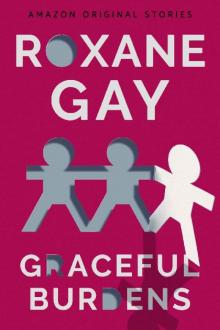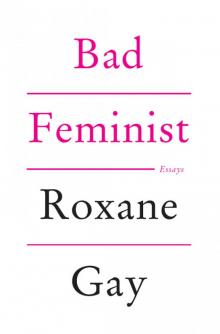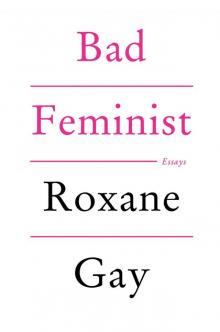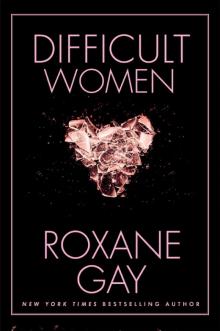- Home
- Roxane Gay
Bad Feminist: Essays Page 28
Bad Feminist: Essays Read online
Page 28
I’m not the only outspoken woman who shies away from the feminist label, who fears the consequences of accepting the label.
In an August 2012 interview with Salon’s Andrew O’Hehir, actress Melissa Leo, known for playing groundbreaking female roles, said, “Well, I don’t think of myself as a feminist at all. As soon as we start labeling and categorizing ourselves and others, that’s going to shut down the world. I would never say that. Like, I just did that episode with Louis C.K.” Leo is buying into a great many essential feminist myths with her comment. We are categorized and labeled from the moment we come into this world by gender, race, size, hair color, eye color, and so forth. The older we get, the more labels and categories we collect. If labeling and categorizing ourselves is going to shut the world down, it has been a long time coming. More disconcerting, though, is the assertion that a feminist wouldn’t take a role on Louis C.K.’s sitcom, Louie, or that a feminist would be unable to find C.K.’s brand of humor amusing. For Leo, there are feminists and then there are women who defy categorization and are willing to embrace career opportunities.
Trailbreaking female leaders in the corporate world tend to reject the feminist label too. Marissa Mayer, who was appointed president and CEO of Yahoo! in July 2012, said in an interview,
I don’t think that I would consider myself a feminist. I think that I certainly believe in equal rights, I believe that women are just as capable, if not more so in a lot of different dimensions, but I don’t, I think, have sort of the militant drive and the sort of, the chip on the shoulder that sometimes comes with that. And I think it’s too bad, but I do think that “feminism” has become in many ways a more negative word. You know, there are amazing opportunities all over the world for women, and I think that there is more good that comes out of positive energy around that than comes out of negative energy.
For Mayer, even though she is a pioneering woman, feminism is associated with militancy and preconceived notions. Feminism is negative, and despite the feminist strides she has made through her career at Google and now Yahoo!, she’d prefer to eschew the label for the sake of so-called positive energy.
Audre Lorde once stated, “I am a Black Feminist. I mean I recognize that my power as well as my primary oppressions come as a result of my blackness as well as my womanness, and therefore my struggles on both of these fronts are inseparable.” As a woman of color, I find that some feminists don’t seem terribly concerned with the issues unique to women of color—the ongoing effects of racism and postcolonialism, the status of women in the Third World, the fight against the trenchant archetypes black women are forced into (angry black woman, mammy, Hottentot, and the like).
White feminists often suggest that by believing there are issues unique to women of color, an unnatural division occurs, impeding solidarity, sisterhood. Other times, white feminists are simply dismissive of these issues. In 2008, prominent blogger Amanda Marcotte was accused of appropriating ideas for her article “Can a Person Be Illegal?” from the blogger “brownfemipower,” who posted a speech she gave on the same subject a few days prior to the publication of Marcotte’s article. The question of where original thought ends and borrowed concepts begin was complicated significantly in this case by the sense that a white person had yet again taken the creative work of a person of color.
The feminist blogosphere engaged in an intense debate over these issues, at times so acrimonious black feminists were labeled “radical black feminists,” were accused of overreacting and, of course, “playing the race card.”
Such willful ignorance, such willful disinterest in incorporating the issues and concerns of black women into the mainstream feminist project, makes me disinclined to own the feminist label until it embraces people like me. Is that my way of essentializing feminism, of suggesting there’s a right kind of feminism or a more inclusive feminism? Perhaps. This is all murky for me, but a continued insensitivity, within feminist circles, on the matter of race is a serious problem.
There’s also this. Lately, magazines have been telling me there’s something wrong with feminism or women trying to achieve a work-life balance or just women in general. The Atlantic has led the way in these lamentations. In the aforementioned June 2012 article, Elizabeth Wurtzel, author of Prozac Nation, wrote a searing polemic about “1% wives” who are hurting feminism and the progress of women by choosing to stay at home rather than enter the workplace. Wurtzel begins the essay provocatively, stating,
When my mind gets stuck on everything that is wrong with feminism, it brings out the 19th century poet in me: Let me count the ways. Most of all, feminism is pretty much a nice girl who really, really wants so badly to be liked by everybody—ladies who lunch, men who hate women, all the morons who demand choice and don’t understand responsibility—that it has become the easy lay of social movements.
There are problems with feminism. Wurtzel says so, and she is vigorous in defending her position. Wurtzel knows the right way for feminism. In that article, Wurtzel goes on to state there is only one kind of equality, economic equality, and until women recognize that and enter the workforce en masse, feminists, and wealthy feminists in particular, will continue to fail. They will continue to be bad feminists, falling short of essential ideals of feminism. Wurtzel isn’t wrong about the importance of economic equality, but she is wrong in assuming that with economic equality, the rest of feminism’s concerns will somehow disappear.
In the July/August 2012 Atlantic, Anne-Marie Slaughter wrote more than twelve thousand words about the struggles of powerful, successful women to “have it all.” Her article was interesting and thoughtful, for a certain kind of woman—a wealthy woman with a very successful career. She even parlayed the piece into a book deal. Slaughter was speaking to a small, elite group of women while ignoring the millions of women who don’t have the privilege of, as Slaughter did, leaving high-powered positions at the State Department to spend more time with their sons. Many women who work do so because they have to. Working has little to do with having it all and much more to do with having food on the table.
Slaughter wrote,
I’d been the woman congratulating herself on her unswerving commitment to the feminist cause, chatting smugly with her dwindling number of college or law-school friends who had reached and maintained their place on the highest rungs of their profession. I’d been the one telling young women at my lectures that you can have it all and do it all, regardless of what field you are in.
The thing is, I am not at all sure that feminism has ever suggested women can have it all. This notion of being able to have it all is always misattributed to feminism when really, it’s human nature to want it all—to have cake and eat it too without necessarily focusing on how we can get there and how we can make “having it all” possible for a wider range of people and not just the lucky ones.
Alas, poor feminism. So much responsibility keeps getting piled on the shoulders of a movement whose primary purpose is to achieve equality, in all realms, between men and women. I keep reading these articles and getting angry and tired because they suggest there’s no way for women to ever get it right. These articles make it seem like, as Butler suggests, there is, in fact, a right way to be a woman and a wrong way to be a woman. The standard for the right way to be a woman and/or a feminist appears to be ever changing and unachievable.
In the weeks leading up to the publication of Sheryl Sandberg’s Lean In, critics had plenty to say about the Facebook chief operating officer’s ideas about being a woman in the workplace—even though few had actually read the tome. Many of the resulting discussions bizarrely mischaracterized Lean In, tossing around misleading headlines, inaccurate facts, and unfair assumptions.
As it turns out, not even a fairly average entry into the world of corporate advice books is immune from double standards.
Sandberg intersperses personal anecdotes from her remarkable career (a vice presidency at Google, serving as the US Treasury’s chief of staff during the Clinton adminis
tration) with observations, research, and pragmatic advice for how women can better achieve professional and personal success. She urges women to “lean in” to their careers and to be “ambitious in any pursuit.” Lean In is competently written, blandly interesting, and it does repeat a great deal of familiar research—although it isn’t particularly harmful to be reminded of the challenges women face as they try to get ahead.
Intentionally or not, much of the book is a stark reminder of the many obstacles women face in the workplace. I cannot deny that parts resonated, particularly in Sandberg’s discussion about “impostor syndrome” and how women are less willing to take advantage of potential career opportunities unless they feel qualified.
But Sandberg is rigidly committed to the gender binary, and Lean In is exceedingly heteronormative. Professional women are largely defined in relation to professional men; Lean In’s loudest unspoken advice seems to dictate that women should embrace traditionally masculine qualities (self-confidence, risk taking, aggression, etc.). Occasionally, this advice backfires because it seems as if Sandberg is advocating, If you want to succeed, be an asshole. In addition, Sandberg generally assumes a woman will want to fulfill professional ambitions while also marrying a man and having children. Yes, she says, “Not all women want careers. Not all women want children. Not all women want both. I would never advocate that we should all have the same objectives.” But she contradicts herself by placing every single parable within the context of heterosexual women who want a wildly successful career and a rounded-out nuclear family. Accepting that Sandberg is writing to a very specific audience, and has little to offer those who don’t fall within that target demographic, makes enjoying the book a lot easier.
One of the main questions that has arisen in the wake of Lean In’s publication is whether Sandberg has a responsibility to women who don’t fall within her target demographic. Like Slaughter, Sandberg is speaking to a rather narrow group of women. In the New York Times, Jodi Kantor writes, “Even [Sandberg’s] advisers acknowledge the awkwardness of a woman with double Harvard degrees, dual stock riches (from Facebook and Google, where she also worked), a 9,000-square-foot house and a small army of household help urging less fortunate women to look inward and work harder.”
At times, the inescapable evidence of Sandberg’s fortune is grating. She casually discusses her mentor Larry Summers, working for the Treasury department, her doctor siblings, and her equally successful husband, David Goldberg. (As CEO of SurveyMonkey, Goldberg moved the company headquarters from Portland to the Bay Area so he could more fully commit to his family.) She gives the impression that her movement from one ideal situation to the next is easily replicable.
Sandberg’s life is so absurd a fairy tale, I began to think of Lean In as a snow globe, where a lovely little tableau was being nicely preserved for my delectation and irritation. I would not be so bold as to suggest Sandberg has it all, but I need to believe she is pretty damn close to whatever “having it all” might look like. Common sense dictates that it is not realistic to assume anyone could achieve Sandberg’s successes simply by “leaning in” and working harder—but that doesn’t mean Sandberg has nothing to offer, or that Lean In should be summarily dismissed.
Cultural critics can get a bit precious and condescending about marginalized groups, and in the debate over Lean In “working-class women” have been lumped into a vaguely defined group of women who work too hard for too little money. But very little consideration has been given to these women as actual people who live in the world, and who maybe, just maybe, have ambitions too.
There has been, unsurprisingly, significant pushback against the notion that leaning in is a reasonable option for working-class women, who are already stretched woefully thin. Sandberg is not oblivious to her privilege, noting:
I am fully aware that most women are not focused on changing social norms for the next generation but simply trying to get through each day. Forty percent of employed mothers lack sick days and vacation leave, and about 50 percent of employed mothers are unable to take time off to care for a sick child. Only about half of women receive any pay during maternity leave. These policies can have severe consequences; families with no access to paid family leave often go into debt and can fall into poverty. Part-time jobs with fluctuating schedules offer little chance to plan and often stop short of the forty-hour week that provides basic benefits.
It would have been useful if Sandberg offered realistic advice about career management for women who are dealing with such circumstances. It would also be useful if we had flying cars. Assuming Sandberg’s advice is completely useless for working-class women is just as shortsighted as claiming her advice needs to be completely applicable to all women. And let’s be frank: if Sandberg chose to offer career advice for working-class women, a group she clearly knows little about, she would have been just as harshly criticized for overstepping her bounds.
The critical response to Lean In is not entirely misplaced, but it is emblematic of the dangers of public womanhood. Public women, and feminists in particular, have to be everything to everyone; when they aren’t, they are excoriated for their failure. In some ways, this is understandable. We have come far, but we have so much further to go. We need so very much, and we hope women with a significant platform might be everything we need—a desperately untenable position. As Elizabeth Spiers notes in The Verge,
When’s the last time someone picked up a Jack Welch (or Warren Buffett, or even Donald Trump) bestseller and complained that it was unsympathetic to working class men who had to work multiple jobs to support their families? . . . And who reads a book by Jack Welch and defensively feels that they’re being told that they have to adopt Jack Welch’s lifestyle and professional choices or they are lesser human beings?
Lean In cannot and should not be read as a definitive text, or a book offering universally applicable advice to all women, everywhere. Sandberg is confident and aggressive in her advice, but the reader is under no obligation to do everything she says. Perhaps we can consider Lean In for what it is—just one more reminder that the rules are always different for girls, no matter who they are and no matter what they do.
Bad Feminist: Take Two
I am failing as a woman. I am failing as a feminist. To freely accept the feminist label would not be fair to good feminists. If I am, indeed, a feminist, I am a rather bad one. I am a mess of contradictions. There are many ways in which I am doing feminism wrong, at least according to the way my perceptions of feminism have been warped by being a woman.
I want to be independent, but I want to be taken care of and have someone to come home to. I have a job I’m pretty good at. I am in charge of things. I am on committees. People respect me and take my counsel. I want to be strong and professional, but I resent how hard I have to work to be taken seriously, to receive a fraction of the consideration I might otherwise receive. Sometimes I feel an overwhelming need to cry at work, so I close my office door and lose it.
I want to be in charge and respected and in control, but I want to surrender, completely, in certain aspects of my life. Who wants to grow up?
When I drive to work, I listen to thuggish rap at a very loud volume even though the lyrics are degrading to women and offend me to my core. The classic Ying Yang Twins song “Salt Shaker”? It’s amazing. “Bitch you gotta shake it till your camel starts to hurt.”
Poetry.
(I am mortified by my music choices.)
I care what people think.
Pink is my favorite color. I used to say my favorite color was black to be cool, but it is pink—all shades of pink. If I have an accessory, it is probably pink. I read Vogue, and I’m not doing it ironically, though it might seem that way. I once live-tweeted the September issue. I demonstrate little outward evidence of this, but I have a very indulgent fantasy where I have a closet full of pretty shoes and purses and matching outfits. I love dresses. For years I pretended I hated them, but I don’t. Maxi dresses are one of the finest clo
thing items to become popular in recent memory. I have opinions on maxi dresses! I shave my legs! Again, this mortifies me. If I take issue with the unrealistic standards of beauty women are held to, I shouldn’t have a secret fondness for fashion and smooth calves, right?
I know nothing about cars. When I take my car to the mechanic, they are speaking a foreign language. A mechanic asks what’s wrong with my car, and I stutter things like, “Well, there’s a sound I try to drown out with my radio.” The windshield wiper fluid for the rear window of my car no longer sprays the window. It just sprays the air. I don’t know how to deal with this. It feels like an expensive problem. I still call my father with questions about cars and am not terribly interested in changing any of my car-related ignorance. I don’t want to be good at cars. Good feminists, I assume, are independent enough to address vehicular crises on their own; they are independent enough to care.
Despite what people think based on my opinion writing, I very much like men. They’re interesting to me, and I mostly wish they would be better about how they treat women so I wouldn’t have to call them out so often. And still, I put up with nonsense from unsuitable men even though I know better and can do better. I love diamonds and the excess of weddings. I consider certain domestic tasks as gendered, mostly all in my favor as I don’t care for chores—lawn care, bug killing, and trash removal, for example, are men’s work.
Sometimes, a lot of the time honestly, I totally fake “it” because it’s easier. I am a fan of orgasms, but they take time, and in many instances I don’t want to spend that time. All too often I don’t really like the guy enough to explain the calculus of my desire. Then I feel guilty because the sisterhood would not approve. I’m not even sure what the sisterhood is, but the idea of a sisterhood menaces me, quietly, reminding me of how bad a feminist I am. Good feminists don’t fear the sisterhood because they know they are comporting themselves in sisterhood-approved ways.

 Graceful Burdens (Out of Line collection)
Graceful Burdens (Out of Line collection) The Best American Short Stories 2018
The Best American Short Stories 2018 Bad Feminist
Bad Feminist Bad Feminist: Essays
Bad Feminist: Essays Ayiti
Ayiti Difficult Women
Difficult Women An Untamed State
An Untamed State Hunger
Hunger